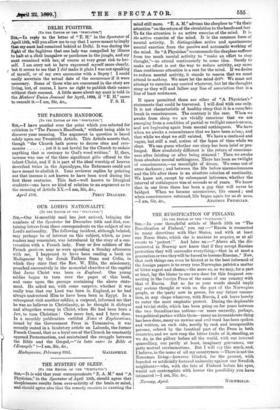THE MYSTERY OF SLEEP.
[To THE EDITOR OF THE "srEcrAron.1 Sur,--It is odd that your correspondents "E A. M." and "A Physician." in the Spectator of April 15th, should agree that sleeplessness results from over-activity of the brain or mind, and should agree also that the remedy consists in exerting the mind still more. "E. A. M." advises the sleepless to "fix their attention "on the return of the circulation to the hands and feet To fix the attention is an active exercise of the mind. It is the active exercise of the mind. It is the common form of mental activity. It distinguishes active and spontaneous mental exertion from the passive and automatic working of the mind. So "A Physician" recommends the sleepless sufferer from too much mental activity to "make an effort to stop thought,"—to attend continuously to some idea. Surely to make an effort is not the way to reduce activity, any more than continuous attention is a rest for the mind. If we desire to reduce mental activity, it stands to reason that we must attend to nothing. We must let the mind drift We must not attempt to exercise any control whatever, but let the thoughts stray as they will and follow any line of association that is a line of least resistance.
If space permitted there are other of "A Physician's" statements that could be traversed. I will deal with one only. It is not characteristic of healthy sleep that it is a comrlete break in consciousness. The contrary is the case. When we awake from sleep we are vividly conscious that we are emerging from a condition of partial or twilight consciousness, and not beginning again from mental nothingness. We have when we awake a remembrance that we have been asleep, and that while-we slept we still existed. We have a confused and vague, but still a real, notion of the lapse of time while we slept. We can guess whether our sleep has been brief or pro- longed. How absolutely different is the return Of conscious- ness after fainting or after being stunned ! Then we awake from absolute mental nothingness. There has been no twilight of consciousness,—no moonlight of dream. 'We come out of utter darkness ; and between the life before unconsciousness and the life after there is' an absolute solution of continuity. We know not, except by subsequent inference, whether the interval of nothingness was of seconds or Of years. We know that in our lives there has been a gap that will never be bridged. When we became unconscious, life ceased ; and when consciousness returned, life began again for us de novo.






































 Previous page
Previous page